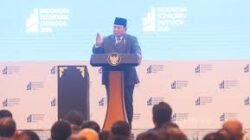Indonesiantalk.com — Overlooked Events at the End of 2024
By Hamidin (Observer of Global Radicalism)
As we approached the end of 2024, domestic headlines in our country were dominated by reports on law enforcement, corruption cases, and social-political issues. From the exploits of national political figures and counterfeit currency crimes on campuses to incidents involving extortion of foreigners by rogue law enforcement officers, our focus remained largely inward.
Even seasonal concerns, such as the heavy traffic during the holiday exodus, took precedence over critical developments in regional and global security. This lack of attention to international affairs is worrying, as some of these events carry profound implications.
Through discussions with media colleagues abroad, I have identified several significant global developments that seem to have escaped our collective notice. Let me share some of them.
The Hodeidah Attack
On Thursday, December 26, 2024, Hodeidah, a city west of Sana’a, Yemen’s capital, was assaulted by Israeli forces. The attack claimed six lives and left dozens gravely injured. This act of aggression deeply shook global sensibilities, particularly as it coincided with the departure of a high-level World Health Organization (WHO) delegation led by Tedros Adhanom Ghebreyesus from Yemen.
UN Secretary-General Antonio Guterres expressed profound disappointment and concern over the escalating tensions between Yemen and Israel. His statement highlighted the growing fragility of peace in the region.
December 30: A Civilian Airport Under Fire
Two days before year-end, Israeli airstrikes targeted Yemen’s main airport just as a Yemenia Airways Airbus A320 landed with hundreds of passengers aboard. UN delegates present in the VIP lounge narrowly escaped harm.
Julien Harneis, a UN safety official, remarked that the most alarming aspect of these attacks was the destruction of the control tower as the aircraft landed. The incident prompted retaliatory threats from the Houthi group, backed by Iran. Hours later, Israel announced it had intercepted a missile launched from Yemen, escalating tensions further.
A Lone Wolf in Israel
In Israel, the year’s final week saw a lone-wolf stabbing attack in Herzliya. Ibrahim Shalhob, a 28-year-old from Tulkarem, fatally stabbed an 83-year-old woman, Ludmila Lipovsky, near a nursing home. The incident was both shocking and tragic, marked by the assailant shouting “Allahu Akbar” before his act of violence. Israeli security forces neutralized Shalhob at the scene.
Christmas Market Tragedy in Germany
On the same day, a similar lone-wolf attack unfolded in Magdeburg, East Germany. A man intentionally drove an SUV into a crowded Christmas market, killing two and injuring 60 others. Local authorities confirmed that it was a deliberate act, and the driver was apprehended at the scene.
Eyewitness footage documented the chaotic aftermath, with a police officer subduing the suspect at gunpoint. Officials warned that the death toll could rise as 15 victims remained in critical condition.
Escalating Conflicts in Lebanon
Earlier in the year, on September 17 and 18, Israel launched two waves of airstrikes targeting Hezbollah communication devices in Lebanon. These attacks killed 21 people and injured over 3,000, including Iran’s Ambassador Mojtaba Emani. The strikes caused widespread chaos, with hospitals overwhelmed by casualties suffering eye, facial, and hand injuries.
The international community responded with alarm. The UN condemned the attacks as violations of human rights, while Iranian President Massoud Pezeshkian described them as “inhumane acts of brutality.” Iran dispatched medical teams to assist victims, including children as young as three.
Despite mounting evidence, Israel issued no official statement acknowledging its involvement. Hezbollah’s vow of retaliation added fuel to an already volatile situation.
Analysis and Implications
Iranian media outlets speculated that Israel’s attacks aimed to sever Hezbollah’s support for Gaza while avoiding the costs of direct military engagement. This strategy underscores Israel’s efforts to maintain regional dominance without provoking large-scale conflict.
However, these actions have heightened regional instability. The UN and the United States have urged restraint, warning that continued aggression could lead to broader conflict. As tensions rise, the fragile balance of power in the Middle East faces unprecedented challenges.
Closing Thoughts
These overlooked global events underscore the need for vigilance and a broader perspective. While domestic issues merit attention, the interconnected nature of our world demands that we remain informed about international developments. Only then can we engage constructively in addressing the challenges that define our shared humanity.









